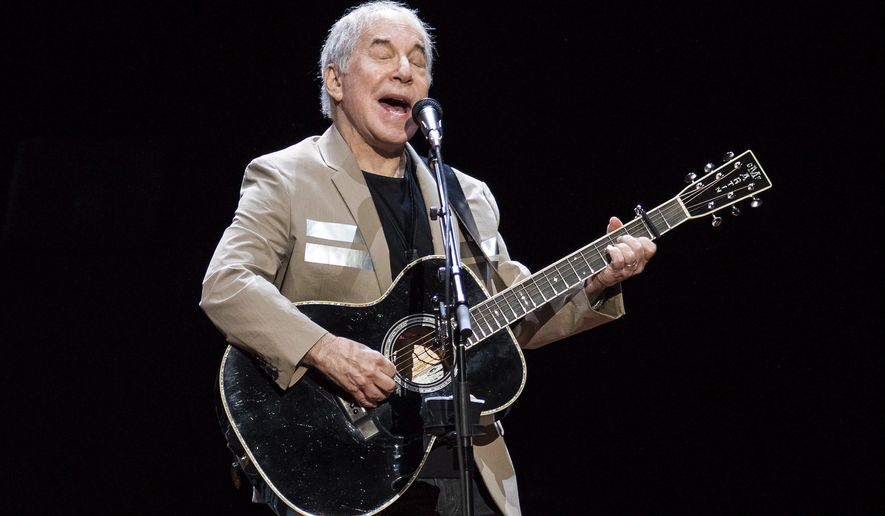NEW YORK (AP) — Farewell tours don’t always mean farewell, but are a ripe time for appreciation and appraisal. Paul Simon’s concerts and a new biography offer the opportunity for both.
Simon’s “Homeward Bound” tour began last week in Vancouver and takes him across North America, to Europe and an eventual conclusion with three dates back home in New York City.
Simon, who’s 76, isn’t retiring. He has an album due out this fall and promises he’ll still occasionally appear on stage. Since he started writing songs as a teen-ager, it’s hard to imagine that impulse shutting off forever. He’s done with the idea of long concert tours, though, so if you live in Greensboro, North Carolina, Austin, Texas or Orlando, Florida, and want to see him perform, this is probably it.
The death of his lead guitarist and friend, Vincent N’guini, last December influenced his decision to step away, Simon said in a statement when the tour was announced. (He has declined interview requests).
“Mostly, though, I feel the travel and time away from my wife and family takes a toll that detracts from the joy of playing,” he said.
The set list from the tour’s opener in Vancouver indicates that he’s exploring the breadth of his career — from Simon & Garfunkel favorites like “Mrs. Robinson” and “America” to touchstones from “Graceland” and recent fare “Dazzling Blue” and “Rewrite.” With a 16-piece band, he often searches for new ways to tell familiar stories.
“He was far more a curious musician than a self-congratulatory, self-repeating pop star,” wrote Jon Pareles of The New York Times in his review of opening night.
Simon’s musical restlessness sets him apart from many peers, said Robert Hilburn, author of the just-released book “Paul Simon: The Life.” Simon was interviewed by Hilburn for the book. Many of Simon’s contemporaries aren’t interested in pushing boundaries or have fans who resist if they do. Simon’s last few albums have been adventurous, earning him critical and commercial success.
Many people forget that Simon spent years as a mediocre writer searching for pop hits until his breakthrough song, “The Sound of Silence,” Hilburn said.
“Once he became this great songwriter, he realized right away that you’re always in jeopardy,” he said. “There are always these distractions and temptations. He had this determination and intelligence to know that music is the most important thing — that you could never master it and never take it for granted.”
Hilburn believes that the desire to stretch himself musically was the biggest factor in Simon’s break with partner Art Garfunkel in 1970, not the famous prickly relationship between the childhood chums. “If he hadn’t left Simon & Garfunkel, he’d have burned out like all the others,” Hilburn said.
The two are more distant than ever after an unpleasant end to the “Old Friends” tour in 2012, and Garfunkel declined requests to be interviewed for Hilburn’s biography. So it would be wise not to expect another reunion soon.
For the book, Hilburn pressed Simon to reveal details of the 2014 incident where Simon and his wife, Edie Brickell, were arrested on disorderly conduct charges for a fight at their Connecticut home. Without setting the record straight, it would remain a defining image of their marriage, he argued. Simon refused; instead, a photo of him and Brickell later renewing their vows at their Montauk, New York, home is in the book, standing as Simon’s testimony to the endurance of their relationship.
Even though two of his three wives — Brickell and Carrie Fisher — were celebrities in their own right when they were married, Simon has generally been reluctant to feed the media machine. Hilburn believes that has cost him popularity through the years. Instead, people know Simon through his songs, and they’re likely to be remembered long after he’s gone, he said.
In fact, that legacy drives the album he’s been working on for release this fall. He records again some of the compositions he’s particularly proud of that were lost along the way in terms of public attention. One song on the Vancouver playlist, “Rene and Georgette Magritte with Their Dog After the War,” is a likely target.
Even though Hilburn was the first biographer that Simon cooperated with, they had their clashes. Hilburn wrote that he feared the project was close to breaking down. But ultimately he said Simon kept his word that Hilburn would be the final arbiter of what was written, and gradually opened up.
“With all of the success he’s had, he still loves it when people love the music,” Hilburn said. “He wants people to love the music, not necessarily to like him. But I think if they got to know him, they will get to like him.”




Please read our comment policy before commenting.